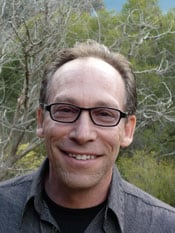By Margaret Harris

Yesterday’s edition of the Physics World online lecture series saw the cosmologist Lawrence Krauss hold forth on one of his favourite subjects: the life and science of his intellectual hero, Richard Feynman.
Krauss has won awards for his work in science communication, and his biography of Feynman, Quantum Man, garnered Physics World‘s own Book of the Year gong for 2011, so it was no surprise to “see” almost 300 of you tuning in yesterday to learn more. But if you weren’t able to watch the lecture live, don’t worry: you can still watch Krauss’s talk on demand here, complete with images of Feynman’s calculus notebooks (a real highlight for me, personally) and Krauss’s eloquent explanation of how Feynman’s beloved first wife, Arline, shaped his way of thinking.
With Feynman as the subject, there were sure to be plenty of questions from audience members at the end of the lecture, and inevitably there wasn’t time for all of them. However, Krauss has now sent us written answers to a few of the most interesting ones, and I’ve pasted his replies below. Enjoy!
Audience member: Do you feel that only scientists like Feynman and Sagan who have an “outgoing” nature that augments the brilliant science they do will be remembered or revered in this day and age?
Lawrence Krauss: Ultimately, I think not. Their names will be most recognized by laypeople in the near term perhaps, but in the long run I believe scientists are remembered for their contributions to changing the way we think about the universe. It takes time for that historical perspective to be obtained, but I believe it arises eventually.
What would you regard as Feynman’s most negative characteristic?
I explain this in more detail in Quantum Man, but I think his persistent desire to redo everything himself (a plus) also meant that he did not follow the work of others as well as he should have. As the American theoretical physicist Sidney Coleman put it, “the other people are not all jerks”, and had Feynman been more aware of this other work, in a number of key areas, he could have had more breakthroughs than he did.
Feynman expressed regret at not reconsidering his involvement with the Manhattan Project after Germany was defeated, but do you think he felt guilt about the technology he helped to create?
I think he ultimately decided he was not responsible for the ills of the world, or what people did with his work. John von Neumann convinced him of this.
Did Feynman believe in any particular physical interpretation of quantum mechanics?
He developed his own, and as for philosophical questions, he avoided them as he got older – rightly, I believe. Amusingly, he said he never really understood quantum mechanics, which is one of the reasons he was hoping for a quantum computer, as that might reveal the quantum world in a way that would have given Feynman a more intuitive understanding.
As with most scientific presentations, it seems as if this one was preaching to the converted. How can we best reach out to a non-scientific audience?
I find it helps to use hooks that relate to things people are already interested in. I used Feynman the “character” as a hook to learn about his science; I used Star Trek as a hook to get people interested in modern physics in my first book; and most recently I have used the religious question of why there is “something rather than nothing” as a hook to teach about modern cosmology.
What area of physics did you talk about when you met Feynman? Also, can we have more details of the weekend you spent with him as an undergraduate?
I was talking about his lecture, which was about the theory of the strong interaction, quantum chromodynamics. I have written about the weekend a bit in the book, and I will leave it at that. My favourite Dirac joke is in the book, too.
Lawrence Krauss’s book Quantum Man: Richard Feynman’s Life in Science (2011 W W Norton) is available now in hardback



